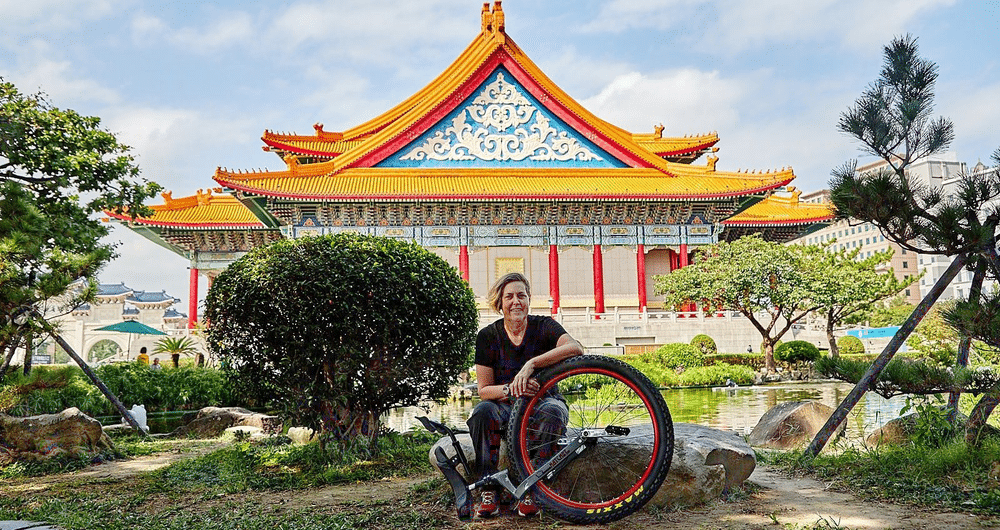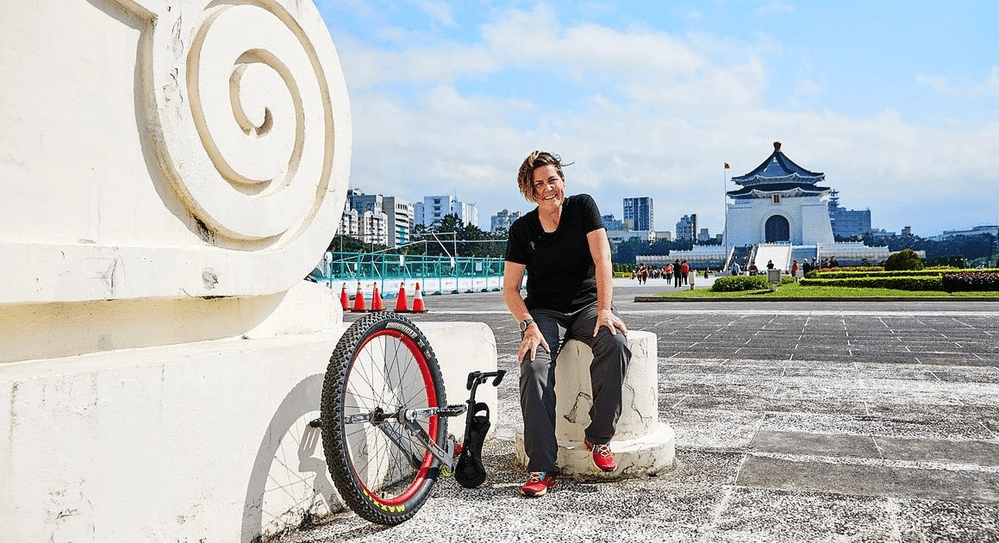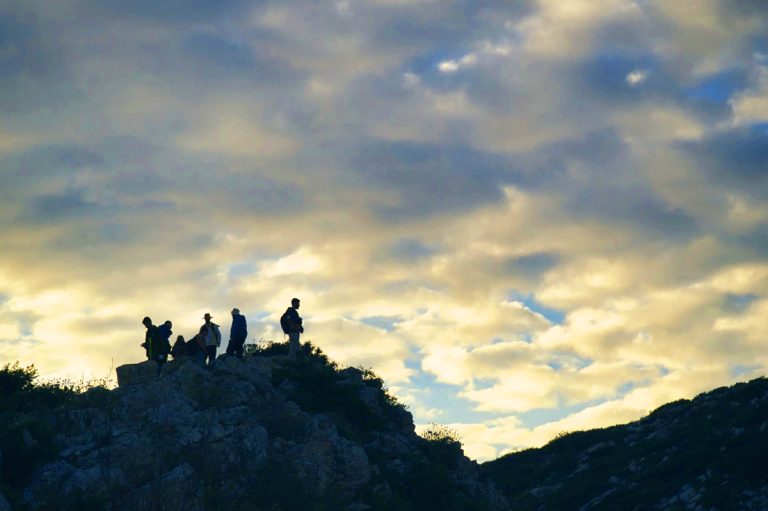The story of an Australian hero

It was a warm day in late October, and Kelli Jackson was feeling relaxed as she pedaled down the bike path along the river, thinking to herself what a thoroughly enjoyable start this was to her 11-day cycling adventure.
Kelli was embarking on a pedal-powered trip the length of Taiwan, 430 kilometers of rice paddies, Buddhist temples, beautiful sunrises, and warm and welcoming Taiwanese people.
Her expedition was not all tropical beaches and bucolic landscapes, however. Kelli, traveling solo, carrying all her own gear, encountered steep and winding roads, close brushes with speeding trucks, and a frightening run-in with a pack of wild dogs.
Also, she was traveling by unicycle.
But this journey was just the start. After pedaling Taiwan from top to bottom in 2018, the following year Kelli unicycled the 540-kilometer north-south route spanning South Korea. She then continued on to North Korea and became the first person from outside that country to unicycle North Korea.
Kelli’s love of outdoor adventure started early in life. She was a Brownie, and a Girl Guide. She rode her bike everywhere, up mountains and hundreds to kilometers to the next town—as a teenager, it made her feel free, and, she says, it was her favorite thing to do.
Kelli explains, “I grew up in Cairns, in north Queensland, which is a bit of a rugged part of Australia. I had parents who liked wild camping and I got to do a couple of Outward Bound courses. That’s sortof where my first love of the bush came from.”
“My parents had a four-wheel drive, and we spent lots of time in the bush,” she said.
In adulthood, however, Kelli’s professional path took her away from the outdoors. “I went to Uni and studied accounting,” she says, and earned an MBA, then joined the public service with the Australian Department of Defence as an accountant. One day, Kelli recalls, “they rang me up and said, ‘Do you want to go to the Middle East?’” She responded, “In the middle of a war zone? As a civilian?”
But Kelli has the heart of an adventurer. “I said, ‘why not?,’ as you would,” she recalls, and had what she called “an incredible journey” overseeing financial operations while deployed in Afghanistan and Kuwait, for which she received the Operational Service Medal.
From Adversity to Advantage
How does one go from a stable, 19-year career in accounting to a lifestyle of unicycling around the world?
In 2015, “I had a difficult personal relationship, a challenging staff member, a disagreement with my Dad and my grandma died,” Kelli relates. “I almost committed suicide—I just couldn’t cope with all that stress.”
Kelli said, “After I almost committed suicide, I didn’t know what to do next.” She shared, “I was so traumatized that I didn’t know who I was any more.”
As Kelli recovered from this stressful period of her life, “I decided in celebration of being alive, that I wanted to do something a bit epic with my life,” she says. Kelli knew she enjoyed bike riding, and she loved travel. “So I decided that I was going to unicycle around the world. But—I couldn’t even ride a unicycle.”
Kelli says of her unicycling plan, “for this overweight, middle-age smoker who couldn’t even walk up a hill, it was the most impossible and daunting thing ever.”
Kelli recognized that healing and growth for her meant she had to re-define her identity. She wrote, “I needed to change from being an overweight, unfit accountant” into her future self—an adventure unicyclist. This was someone, as she defined it, who:
- got quality sleep
- ate healthy food
- prioritised their training
- didn’t watch TV
- wore sports clothes that helped them look and feel like an athlete
- read books about performance and achievement, and biographies about incredible adventurers
- implemented a morning routine that included stretching, journaling and gratitude
- sought out adventure
Kelli stopped smoking. She lost weight. She got fit. And she practiced riding a unicycle, and practiced, and practiced. Hour after hour, day after day, holding on to railings for balance. After a year of dogged persistence, she could ride 300 meters without stopping.
In an article she published about growing from her experience, How a Unicycle Saved My Life, Kelli explains, “It wasn’t so much the learning to unicycle that made me grow—it was the process I had to go through internally, to become someone who could do that.”
Kelli turned adversity into advantage by using her stressful experience to renew and re-vision her priorities and goals. She had re-invented herself as a tenacious, strong, and adventurous athlete—a globe-trotting adventure unicyclist.
Women’s Adventure ACT
An adventurer goes on adventures, and Kelli sought out a women’s community outdoors group in her home city of Canberra, as a way to participate in adventures.
She joined a volunteer-led Meetup group, Women’s Adventure ACT, which organizes outdoor activities for those who identify as women, and is based out of Canberra and the surrounding Australian Capital Territory (ACT).
The organization aims to get women outdoors, learning new skills, and enjoying shared experiences in a safe and supportive environment.
The group’s activities include bushwalks (hikes), backpacking, climbing, abseiling (rappelling), kayaking, caving, mountain biking, canyoning, navigation training, bouldering, snowshoeing, survival skills classes, snow camping, and outdoor skills training. Volunteer group leaders lead many trips, with third-party providers running more technical ones.
The organization started in 2017, and in its first four years provided 450 activities for over 4,000 Canberran women.
Soon after Kelli joined the group, the coordinator became unable to continue leading the volunteer-run organization. In 2018, Kelli agreed to take on leadership of the group, which takes her some 30 hours or more each week, as an unpaid volunteer.
Inclusivity: A Core Value
Women’s Adventure ACT is more than just a facilitator of women’s outdoor excursions.
The organization recognizes that not all women in the Canberra area have equal access to the out-of-doors. And it intentionally and continually invests in reducing that inequity.
Women’s Adventure ACT says, “We want to keep the outdoors accessible, safe, affordable and available to all women of all ages, backgrounds, gender identity, experience and culture.”
How does the group make this aim come alive in practice? Here are seven examples:
A safe space for women
Activities organized by Women’s Adventure ACT are for women only. One of the organization’s core aims is “to provide a safe space for people who frequently experience sexism and other forms of discrimination in outdoor and adventure spaces, primarily from cis men.” Providing a supportive space for women to experience outdoor adventures can help eliminate a barrier women have experienced to participating in outdoor activities.
Including people of all ability levels
As Kelli began organizing activities for group members, she says, “I realized that there was a bunch of people that we weren’t engaging, for example women with disabilities, or women who couldn’t walk very far because of fitness, or women that were recovering from surgery.”
She said, “I hadn’t even realized that I’d been excluding that group because all our activities were based on what I could do.”
The group now intentionally organizes a diverse variety of activities suitable for a broad range of fitness levels. The group has a policy for bushwalks that “we always walk to the slowest member’s capability.”
Access to child care
After recognizing the need for inclusivity for people of diverse ability levels, Kelli says, “And then it just kept kind of going further.”
Kelli recognized that finding affordable childcare is a barrier for many women who would like to participate in outdoor activities. “A lot of women in our group are single mums who have kids…and there are solo things that they want to do but they can’t, because they don’t have access to childcare.”
Women’s Adventure ACT now offers select activities where children are welcome. The group also asks participants who need to cancel to do so with sufficient notice, so that others waiting for a spot to open up have time to arrange childcare.
Access to outdoor equipment
Kelli recognized that accessing outdoor gear can be an obstacle to participating in activities out-of-doors. She established a community Gear Library in 2019, which provides backpacks, tents, camp stoves and other gear to participants.
Pricing
Cost can be an obstacle to getting outdoors. Many of Women’s Adventure ACT’s activities are free or cost AUS $3.50. All are run below the cost it takes to operate the organization’s online presence, pay satellite communicator subscription fees, and conduct recces to plan new trips. (Donations help cover uncompensated expenses.) Support for arranging carpooling is available for those who don’t have transport, and fees are also waived on a needs basis.
Messaging
Kelli says, “We call ourselves a community group, but how can you be a community if you’re only representing part of the community?”
She recognizes that many minority groups aren’t represented in media depictions of people outdoors. For example, Kelli says, in outdoor gear advertisements, “First Nations Australian people who are explorers–you never see those ads…a lot of the kind of hiking businesses that we see here in Australia especially, are for wealthy white women. And so what we’re about is trying to give access to genuine community.”
With some outdoor businesses, Kelli says, if you’re in a minority group, “you might not know whether you’re going to be welcomed.”
“So I think you have to make that obvious, and you have to yell it,” she says, “so that those people in the community at least know that they’re going to be welcomed and feel accepted in your group, rather than, ‘Oh, we’re not sure if this group is for us; they don’t say anything about gay people.’”
Examples of communications from Women’s Adventure ACT that help make clear their commitment to creating a welcoming, inclusive environment include:
- Stating that a core value is to “promote diversity of participation through seeking women of all ages, backgrounds, cultures, gender identity and experiences in our group;”
- Stating, “We welcome diversity in our group—it’s one of our principles—so all LGBTIQ members including non-binary or gender queer participants are especially welcome, and we have a discrimination-free zone;”
- Providing basic information on snakes, peeing in the bush and other outdoor concerns, and providing information sessions on outdoor gear for novices;
- Mentioning how the group has provided support to the LGBTIQ community, including an annual walk for Canberra’s Spring-out Festival;
- Providing information about the group’s monthly Accessibility Walks for those with restricted mobility due to recovery from surgery, disability, or their level of fitness, and
- Promoting beginner rock-climbing and bouldering classes, and learn-to-swim classes, to introduce women to those activities.
Kelli says, “I think it’s just being a decent human, isn’t it, recognizing that that diversity exists in our community, and making those folks feel welcome. So that’s really important to us.”
Including older women
Kelli, who is 54, wants the benefits of outdoor experiences to be accessible to women of all ages and financial status. Women’s Adventure ACT already provides a low-cost and welcoming environment to make this possible, but Kelli has a vision for more.
“I know there’s a real issue with older women, particularly older women who have just been divorced,” she says. “There’s a real risk of them being homeless. They generally don’t have a lot of savings. And they probably don’t have superannuation (pension) because they didn’t work during their marriage.” They’re at significant risk of being lonely and depressed, she explains.
Kelli is working to build the capacity of Women’s Adventure ACT to fund learning and skills training for women in this situation.
She wants to offer these women a basic first aid course and a training on leading groups outdoors. Women’s Adventure ACT would then invite them to lead some short walks in their local reserve, and provide them some funding to help make this possible.
“It gives them a skill; it gives them a purpose. It gives them a reason to get up every week,” Kelli says. “It starts to give them a sense of community because they’re meeting other women. It gives them some health and fitness because they’re getting outdoors.”
Risk Management
Like any organization offering outdoor adventures, Women’s Adventure ACT pays attention to managing risks. These include outdoor-specific risks such as snakebite and heatstroke, but also enterprise-related risks involving liability coverage and financial sustainability.
The group, which describes itself as “getting women safely outdoors,” has written risk management procedures, guidance for program participants, and safety briefing materials for use by trip leaders. Kelli herself has extensive outdoor safety training, is a member of the New South Wales Bush Search and Rescue Unit, and teaches outdoor safety and survival courses for women.
Many of the group’s activities, such as bushwalking, are relatively low risk. Specialist providers run the more technical trips. And Kelli is actively working to build the organization into an incorporated entity that can obtain good insurance coverage and build financial strength.
As part of her continuing investment in risk management, Kelli recently completed the 40-hour online Risk Management for Outdoor Programs training course from Viristar.
She said the class provided information on aspects of risk management she hadn’t previously considered. The course covers how to work effectively with the news media in case of a newsworthy safety incident, for example.
“You don’t typically think about how you deal with a media incident,” Kelli said. “I know most bushwalking clubs say, ‘the President will deal with it,’ but that’s as far as it goes. They don’t talk through what to actually say, how to say it, and how to respond” to media inquiries.
Kelli already had an understanding of essential elements of a good risk management system. But the course “gave me a structured way to put all the components together. That was the most valuable part of it,” she said.
The Viristar course, Kelli noted, helped her evaluate how Women’s Adventure ACT was doing with all the different aspects of risk management. “And then it gave me an action plan about what I need to focus on to improve it,” she said. “It was like a lightbulb moment.”
An Australian hero
The hero’s journey is often considered to tell the story of a person who is called to adventure, experiences a crisis, and who returns home, transformed.
Kelli—drawn to adventures, from the Australian bush to wartime Afghanistan—experienced profound personal struggles. Rising from these challenges, she completed epic journeys across Asia, through tenacity and perseverance finding balance atop on a single rolling wheel. On her return home to Australia, with a new identity as an adventure unicyclist, she became the leader of an organization fostering community, confidence, well-being and leadership skills in women through outdoor adventure.
Through her efforts Kelli is growing and sustaining a welcoming and inclusive space, with excellence in psychological and physical safety, for women of all ages, backgrounds, gender identity, experience and culture.
It is easy, then, to understand why Kelli has been nominated for 2022 Australian of the Year. The award, a forum for honoring the nation’s “most exceptional Australians,” is conferred by the National Australia Day Council, an arm of the Australian government. Kelli has been nominated in the Local Hero award category for the ACT region.
The journey continues
Women’s Adventure ACT, moving forward
Women’s Adventure ACT offers more than Canberra-based outdoor adventures that develop women’s skills and leadership capacities. The organization offers resources online to a global audience, on topics such as What to take on your first women’s overnight hike and An intro to queer inclusivity in the outdoors.
Kelli is also working to transition the outdoor group into a financially sustainable social enterprise that can fund training opportunities for disadvantaged women. For example, she’d like to identify women who are interested to learn how to manage social media. “We pay for a little course for them,” she explains. Then, she says, “we give them a 12-week opportunity to run our social media, but we pay them to do that.”
The organization relies on charitable contributions; those who believe in its mission can learn more and donate to the organization here.
Kelli Jackson: still on a roll
As for Kelli: she’s not standing still. She plans to travel to Singapore in February and unicycle around the entire country—“it’s only 150 kilometers,” she says with a laugh. Her partner, who enjoys travel, may accompany her: “I’m trying to convince her into riding around Singapore with me,” Kelli says.
Circumnavigating the South East Asian nation is only a warmup for her winter plans, however. Kelli will traverse Australia’s remote outback in August, passing wombats, kangaroos and emus as she unicycles 1600 kilometers across Australia’s dry Nullarbor Plain, over the course of a month.
As you explore the great outdoors, or consider journeys abroad, keep an eye out for a wave and a smile from a fellow adventurer, pedaling by. It may be Kelli, adventure unicyclist and Australian hero.




